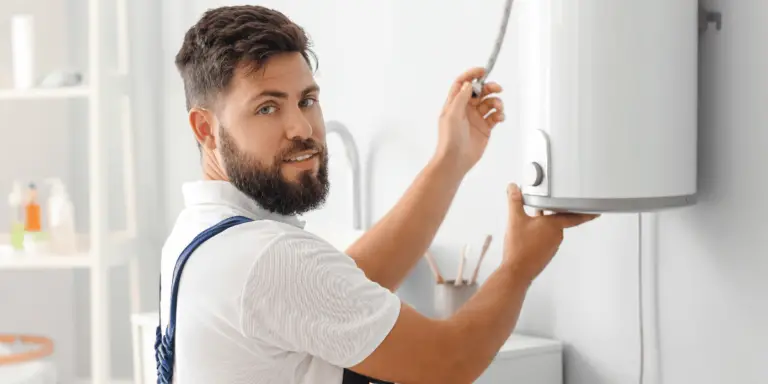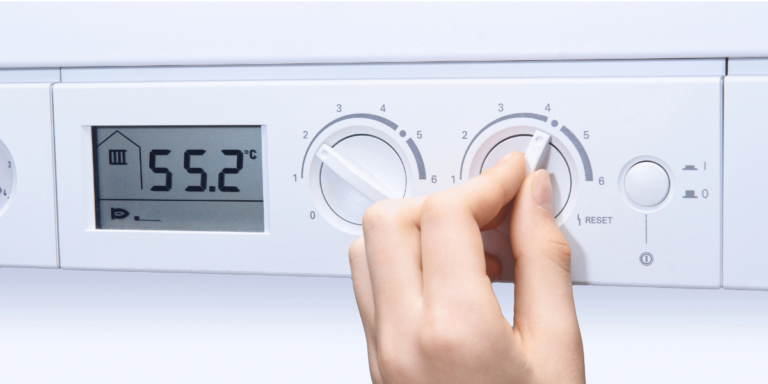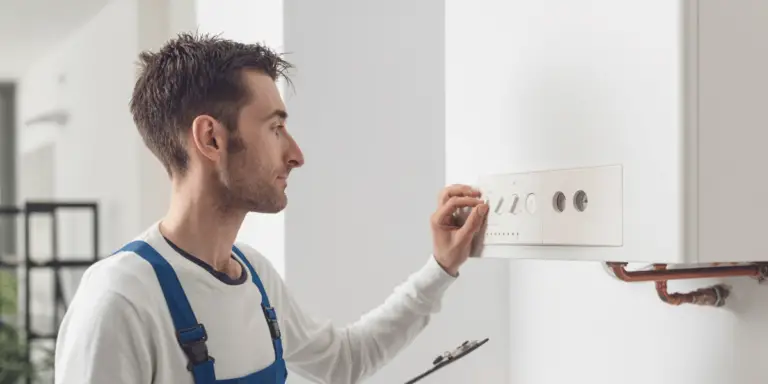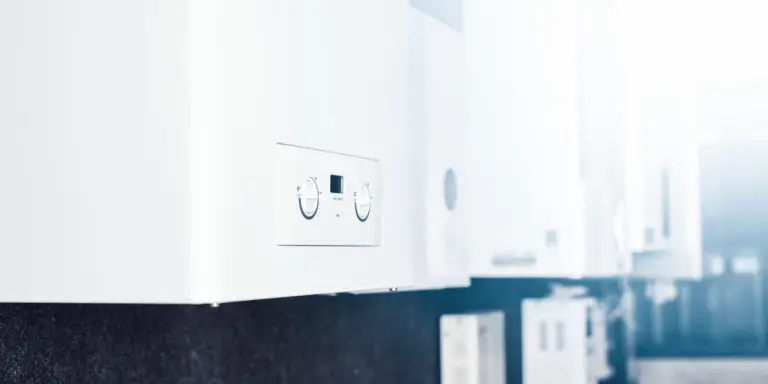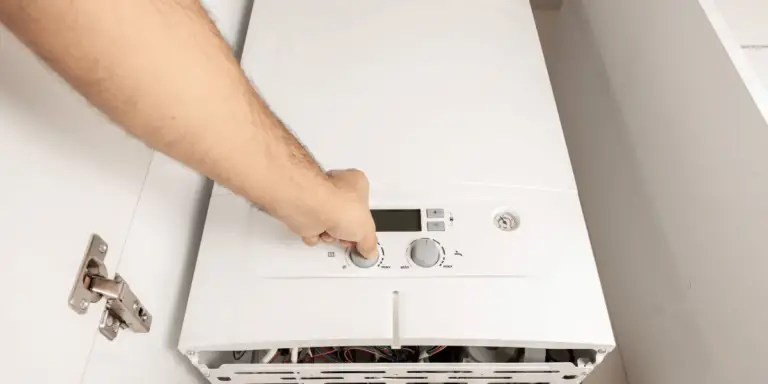Are you confused about what type of boiler is best for your home? With so many options available, it can be overwhelming to make the right choice. But don’t worry, we’re here to help! In this article, we will explain the different types of boilers and their suitability for various homes.
Key Takeaways
- Combi boilers provide instant hot water and heating, making them suitable for small to medium-sized homes with low hot water demand.
- System boilers offer better efficiency due to their hot water cylinder and are ideal for medium to large-sized homes with higher hot water demand.
- Heat only boilers are ideal for traditional heating systems and larger homes, but they require both a boiler and a separate cylinder.
- Combi boilers are generally more affordable and easier to install compared to system boilers and heat only boilers.
What types of boiler are there, and which is best for me?
If you’re wondering what types of boilers are out there and which one would be the best fit for your home, let me break it down for you!
There are three main types of boilers: combination (combi) boilers, regular boilers, and system boilers.
- A combination boiler is a compact unit that provides instant hot water and heating. It doesn’t require a separate cylinder or tank, making it space-saving and cost-effective.
- Regular boilers are ideal for traditional heating systems as they work with a separate hot water storage cylinder and require both a boiler and cylinder in terms of installation.
- System boilers offer better efficiency due to their hot water cylinder but don’t need loft space like regular boilers do. They are suitable for larger homes with multiple bathrooms that have higher hot water demand.
All three types of boilers can be energy efficient and provide central heating, so choose the one that suits your home’s size, hot water requirements, and available space.
The Three Main Types of Boiler
Among the three boiler options, homeowners can choose between a compact and efficient combi boiler, a space-saving system boiler with its own hot water cylinder, or a heat only boiler that’s perfect for traditional heating systems.
Combination boilers
A combination boiler, also known as a combi boiler, is a type of boiler that provides both heating and hot water in one compact unit. It eliminates the need for a separate hot water cylinder or tank, making it ideal for smaller homes with limited space.
What is a combination boiler?
A combination boiler is advantageous in several ways. First, it provides instant hot water without the need for a separate water tank. This eliminates the need for additional space to accommodate a tank. Second, combination boilers are highly efficient, with new models boasting over 90% efficiency. This means they save energy and money by effectively heating water on demand. Third, they are easily serviced, as most engineers are trained to work on combination boilers. Lastly, combination boilers are suitable for small to medium-sized homes with low hot water demands. They efficiently provide hot water and heating based on the specific needs of the household, ensuring comfort while minimizing energy consumption.
How do combination boilers work?
Combination boilers work by providing instant hot water on demand, eliminating the need for a separate cylinder or tank. This not only saves space but also reduces installation costs. Combi boilers are highly efficient, resulting in lower energy bills. Their compact size makes them ideal for homes with limited space. The hot water flow rate of a combi boiler is determined by the mains water pressure, ensuring powerful showers and quick access to hot water whenever needed.
Is a combination boiler right for me?
These boilers might be the perfect fit for your needs if you have a small household, only one bathroom, no loft space, and 10 radiators or fewer. This type of boiler provides both heating and hot water on demand, eliminating the need for a hot water tank or cold water tank. This makes it ideal for homes with limited space. With a combi boiler, you can enjoy instant hot water whenever you need it without the need to wait for a tank to heat up. Installation is also easier and more cost-effective compared to other types of boilers. Many reputable boiler manufacturers offer reliable and efficient combi boilers that can meet your specific requirements.
Conventional boilers
A conventional boiler, also known as a heat only or regular boiler, is a type of boiler that is commonly found in traditional heating systems.
What is a conventional boiler?
Conventional boilers, also known as heat only boilers, are ideal for traditional heating systems and larger homes, they work by heating water and then storing it in a separate cylinder for later use. So, when you need hot water or heating, the stored water is pumped from the cylinder to the radiators or taps in your home.
How do conventional boilers work?
In a conventional boiler system, there are two main components: the boiler itself and a hot water storage tank. Here’s how it all comes together:
1. Water tank: The cold water supply enters a cold water cistern, usually located in the loft space of your home. This tank feeds water into both the heating system and the hot water storage tank.
2. Hot water storage tank: This is where heated water from the boiler is stored for later use. The hot water cylinder is typically found in an airing cupboard or elsewhere in your home.
3. Boiler: The boiler heats up the water that flows through radiators and provides hot tap water when needed. It works by burning gas or oil to create heat energy.
4. Water supply: When you turn on a hot tap, cold water from the cistern flows into the hot water storage tank, displacing the existing heated water which then travels to your taps or showers.
Understanding how a conventional boiler system operates allows you to make informed decisions about which types of boiler systems are best suited for your needs and requirements.
Is a conventional boiler right for me?
If you have a larger household and multiple bathrooms, a conventional boiler might be the way to go. It can provide you with the hot water capacity you need without compromising on water pressure. A conventional boiler is particularly suitable for older houses with low mains pressure.
With this type of boiler, hot water is stored in a separate cylinder and can be accessed from multiple outlets simultaneously. This means that everyone in your household can enjoy a hot shower or use hot water taps at the same time without any loss of pressure.
Additionally, if you live in a larger property, a conventional boiler will ensure that all areas are adequately heated.
However, it’s important to consider that conventional boilers may have higher installation costs and potentially higher heating bills compared to other types of boilers. This is due to their reliance on storing and maintaining hot water in the cylinder.
System boilers
A system boiler is a type of boiler that works alongside a hot water cylinder to provide heating and hot water to your home. It operates by heating water from the mains supply and then circulating it through the central heating system and into the hot water cylinder, where it can be stored for later use.
This means that you have a ready supply of hot water available whenever you need it, without the need for a separate cold-water tank or loft space.
What is a system boiler?
System boilers, with their integrated components and absence of a cold water tank in the attic, offer a space-saving solution while eliminating worries about potential leaks or freezing in the winter. These boilers are ideal for medium to large-sized homes with higher hot water demand. To give you a clearer understanding, let’s take a look at the table below:
| System Boiler | Description |
|---|---|
| Space Saving | Integrated components save space and eliminate the need for a cold water tank in the attic. |
| Quick Installation | Fewer pieces to fit result in quicker installation compared to conventional boilers. |
| Suitable for larger homes | Perfect choice for medium to large-sized homes with higher hot water demand. |
With this information, you can see that system boilers not only provide efficient heating and hot water but also offer convenience by saving space and reducing installation time. They are an excellent option if you’re looking for a reliable heating solution without compromising on comfort or style.
How do system boilers work?
System boilers work by storing hot water in a cylinder, unlike combi boilers which heat water on demand. This means that multiple taps can be used simultaneously without affecting the water pressure. The system boiler is connected to a cold water storage tank, usually located in the loft, which supplies fresh water to the boiler.
As the heated water expands, it flows into an expansion tank to maintain constant pressure. The preheated water is then pushed through the pipes by mains water pressure to various outlets in your home. With an expansion vessel and hot water outlet, system boilers are designed to efficiently distribute heat and deliver hot water when needed.
Is a system boiler right for me?
Considering your home’s water pressure and the age of your central heating system, a system boiler could be the perfect fit for you. Here are some reasons why a system boiler might be the right choice:
- Reliable hot water: With a hot water cylinder, you can enjoy hot water to multiple taps simultaneously, ensuring everyone in your home has access to hot water when they need it.
- Efficient heating: System boilers offer better efficiency compared to other types of boilers due to their hot water cylinder. This means that you can save energy and reduce your heating costs.
- Space-saving design: While system boilers require additional space for the cylinder, they don’t need loft space like heat only boilers do. This makes them suitable for homes with limited space.
- Modern convenience: System boilers are compatible with modern central heating systems, making them a popular choice among homeowners looking for an upgrade.
- Professional installation: To ensure proper installation and optimal performance, it is recommended to hire a boiler installer who specializes in system boilers.
If these benefits align with your needs and preferences, a system boiler may indeed be the right choice for you.
Frequently Asked Questions
Can I use a combi boiler in a larger home with multiple bathrooms?
Yes, you can use a combi boiler in larger homes with multiple bathrooms. However, it’s important to consider the hot water demand. A system boiler may be more suitable due to its ability to provide hot water to multiple taps simultaneously.
Are system boilers more expensive to install compared to combi boilers?
Yes, system boilers can be more expensive to install compared to combi boilers. This is because they require additional space for a hot water cylinder, which adds to the overall cost of installation.
Do heat only boilers require loft space for the tank?
Yes, heat only boilers do require loft space for the tank. This is because the tank is used to store hot water, and it needs to be placed at a higher level in order to provide sufficient water pressure.
Can system boilers provide instant hot water like combi boilers?
Yes, system boilers can provide instant hot water like combi boilers. They have a built-in hot water cylinder which stores and heats water, allowing for multiple taps to receive hot water simultaneously.
Are heat only boilers compatible with renewable technologies like solar panels?
Yes, heat only boilers can be compatible with renewable technologies like solar panels. However, they may require additional components to work efficiently. It’s important to consult with a professional to ensure proper integration and maximize energy efficiency.
Conclusion
Now that you have a better understanding of the different types of boilers, you may be wondering which one is best for you.
Combi boilers are perfect for small to medium-sized homes with low hot water demand and offer instant hot water and heating.
However, if you have a larger home with higher hot water demand, a system boiler might be more suitable due to its efficiency and capacity.
While heat only boilers are ideal for traditional heating systems and larger homes, they do require both a boiler and a separate cylinder.
Now, some may argue that combi boilers lack the ability to provide high water pressure or supply hot water to multiple taps simultaneously. However, the truth is that modern combi boilers can indeed offer excellent water pressure and can support multiple taps without any issues.
So don’t let these concerns hold you back from considering a combi boiler for your home!

